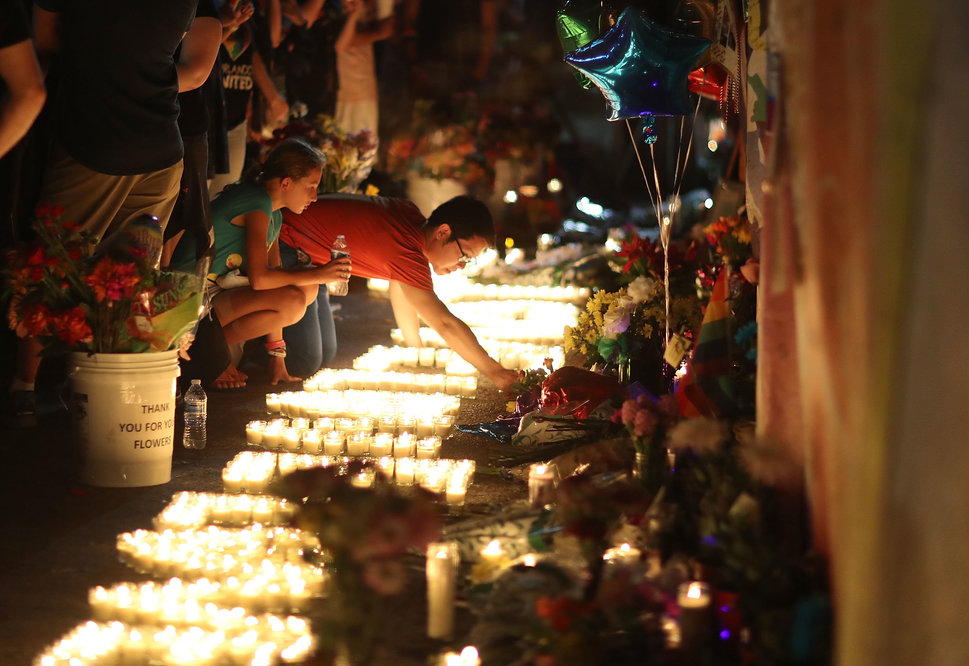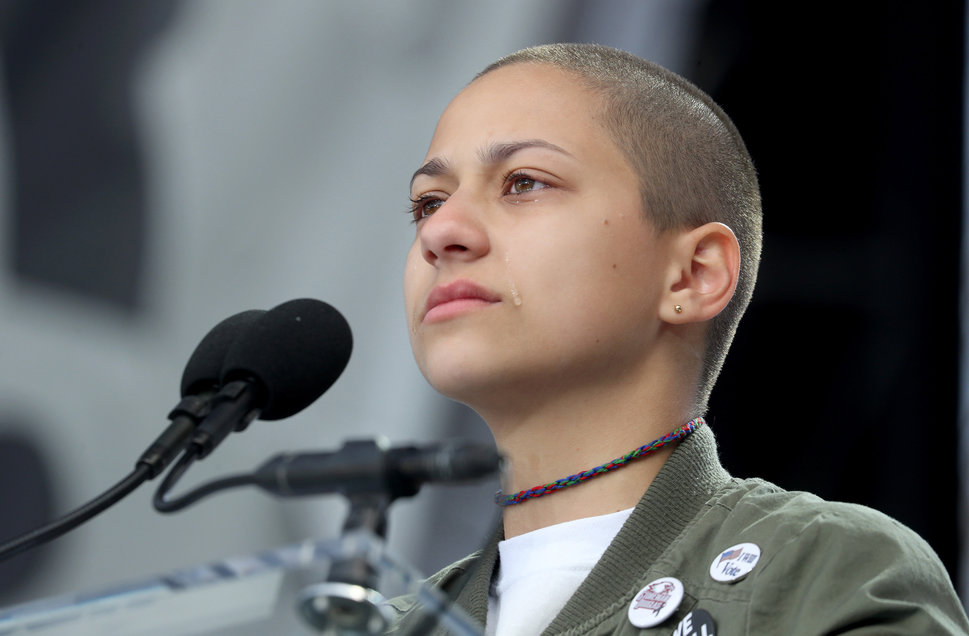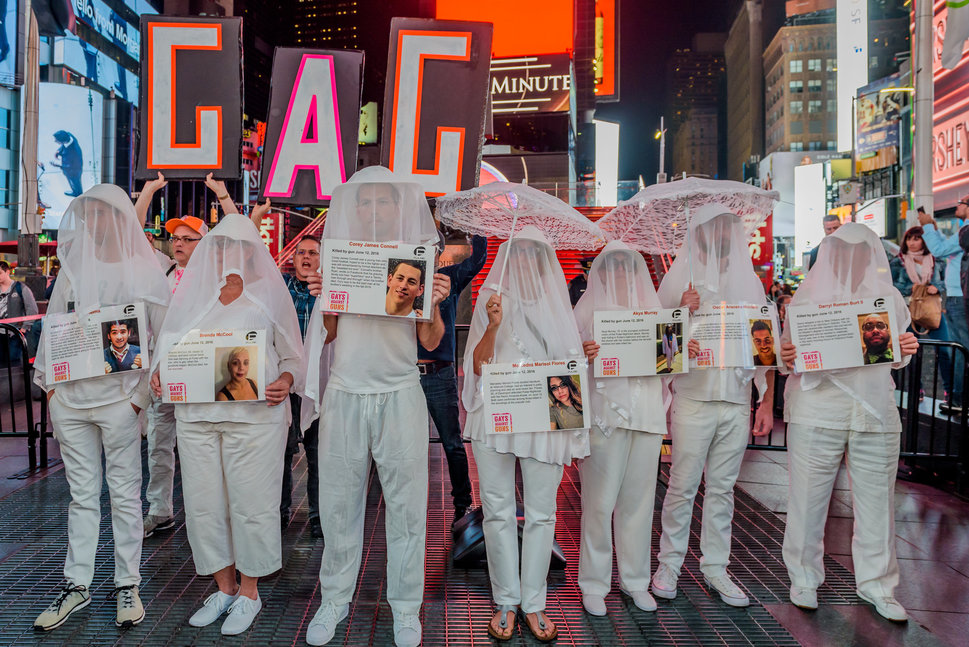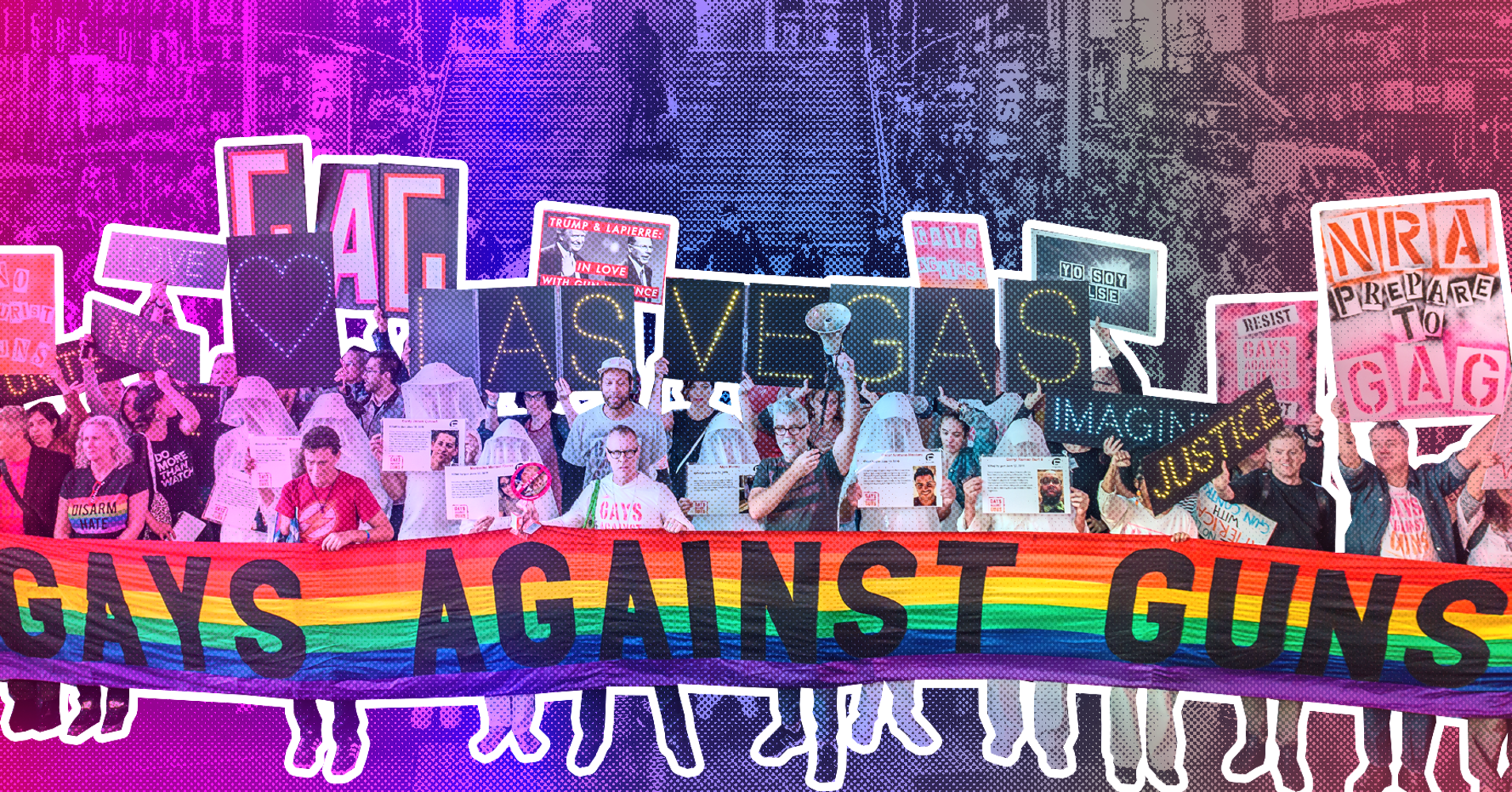[ad_1]
On June 12, 2016, about 300 people gathered in a meeting room at the LGBT Community Center in Manhattan. They were spilling into the hallways because the center didn’t have a room large enough to hold all the people in attendance.
That day, news of the shooting at the Pulse nightclub in Orlando, Florida, had ricocheted across the country: 49 people — largely queer people of color — died, and dozens more were injured. The people at the LGBT Center who came together to express their loss, outrage and unwillingness to let gun violence continue to rip America apart eventually became Gays Against Guns — an advocacy group committed to making comprehensive gun control a reality in the U.S.
“We were outraged, we were hurt, and we were confused,” said Gays Against Guns member Cathy Marino-Thomas. “We had been living during the Obama years with a euphoric hope that we were finally going to move towards some kind of, if not acceptance, then tolerance.”
Before Pulse, she said, gun violence had been lumped in with homophobia and hate crimes by most queer advocacy groups rather than treated as a separate issue. “I don’t know that we made any distinction,” she said.
But Pulse changed the conversation around gun violence ― for those watching, horrified, from the sidelines as well as for those who lived through it.

Joe Raedle / Getty Images
Brandon Wolf survived the shooting at Pulse but lost his best friend, Dru Leinonen — a loss that inspired Wolf to create the Dru Project, an LGBTQ advocacy group focused on gay-straight alliances in public schools. He has seen how the queer community has rallied behind the fight to end gun violence. “We can’t be following, because we’re the ones that are most impacted by it,” he told HuffPost.
“We’ve realized our place in the conversation and the leadership role we have to take. If you go anywhere in this country and you talk about Pulse, you talk about 49 lives lost. People feel that. Queer people feel that. It’s unsettling. It makes us feel unsafe. It reminds us that we have so much further to go. The reality is that violence and hatred are still very much alive in this country. They’re being fed by the current administration. There’s a realization in the queer community that we have to be the leaders in this fight.”
This February the conversation around gun violence changed again after the shooting at Marjory Stoneman Douglas High School in Parkland, Florida. In the months since the shooting, survivors have become powerful voices in the gun control movement, and one of the most visible has been 18-year-old Emma Gonzalez.
“It doesn’t surprise me that the person leading the gun violence movement out of Marjory Stoneman Douglas High School is a queer Latin female, because that’s the future,” said Wolf. “These communities most impacted by gun violence are going to stand up and have a say, and they’re not going to take no for an answer.”
Gonzalez delivered a moving speech at the March for Our Lives in Washington, D.C., during which she stayed silent for six and a half minutes — the amount of time it took a gunman to kill 17 students at her high school. In Wolf’s eyes, it showed how powerful one queer person, backed by those who stand to inherit this country, could be.
“Both queer people and the youth of America understand the power of protest, and neither group is afraid to do that,” said Marino-Thomas. “These kids are amazing. The people on the other side of these issues should be scared of them because they understand their power. They understand the power of the vote. They’ve actually read the Constitution, and they know that they can change it. They know that world is about to be handed over to them, and they are taking it.”

Sun Sentinel / Getty Images
According to Marino-Thomas, the Pulse and Parkland survivors share the experience of extreme violence in places where they were supposed to be protected. “The kids are in it because this issue came into their safe space, and that’s the reason queer people are as well,” she said.
Clubs have a long tradition as queer community spaces, and in the wake of Pulse, queer people had to reckon with the desecration of that sanctuary. “You can’t discount Pulse as a catalyst for why we’re involved. It finally came into our home, and we had to do something,” she added.
After the shooting in Parkland, Gov. Rick Scott helped pass gun safety legislation for the first time in Florida in 22 years — but that’s only one state, where two of the most horrific mass shootings in recent memory took place.
“Six hundred and twelve days passed between Pulse and Parkwood. There was no change in that 612 days that passed, but 96 Americans died every single one of those 612 days,” Wolf said, citing a statistic supported by Everytown, a nonprofit group that tracks gun violence. “You have to ask yourself at some point, ‘What more can you stomach from gun violence in this country? How much longer can you turn off the television or change it to something a little less unnerving?’ Six hundred and twelve days passed with no change, not in Florida, not in America, and 96 people died every single one of those days. I say that’s too many. I say that’s too much gun violence. I’m just wondering at what point this country will say enough is enough.”
According to Everytown, there are 13,000 gun-related homicides a year in the United States. For every person killed by a gun, two more are injured. Seven children and teens are killed by guns every day in America, on average. So far in 2018 there have been 25,664 incidents of gun violence reported, according to the Gun Violence Archive. And while cold hard numbers are sobering, it’s easy for Americans to become desensitized to them. That’s why organizations like Gays Against Guns aim to replace these numbers with human faces through public demonstrations.
Gays Against Guns works mostly through protest, staging monthly die-ins at senatorial office buildings, using their bodies to represent those slain by gun violence, often leading to members’ arrests. They also connect the chain of death, linking gun manufacturers, people who purchase guns without proper background checks, companies that invest in gun manufacturers, companies that invest in the NRA and perpetuate their power, legislators that take money from the NRA and NRA leaders who attempt to dictate laws.
And in Marino-Thomas’ eyes, this work, in conjunction with other public forms of pushback against the NRA, is changing things. Many airlines that gave discounts to NRA members have stopped doing so. Car rental companies that have donated money to the NRA have stopped. Most overnight shipping services no longer give NRA discounts — except FedEx, which continues to give members 25 percent off. “We have taken a different approach to direct action and in making the connections in how the NRA has become so powerful,” she said.
At the March for Our Lives in New York, Gays Against Guns helped put together a group of demonstrators, each holding a photo of a shooting victim in Parkland and at the Sandy Hook Elementary School in Newtown, Connecticut. “When you saw the … people, mostly small children and people standing in for them, you felt the loss,” she said. “When you see the photograph, held by an actual person, representing the life that had been taken, you felt it. People had to look at them all day, march next to them, and it made a difference. When people are confronted with the actual bodies, it’s a very powerful statement.”

Pacific Press / Getty Images
Sometimes, Marino-Thomas added, it feels that the movement to end gun violence isn’t working hard enough and fast enough. But she believes a significant breakthrough is near. “These movements get really bad before they get better. I worked on marriage equality for 17 years, and right before a big win, we always had a great loss. In the 2008 election, we got Barack Obama elected, but we lost four initiatives. I feel to some degree, it’s the same way here. Discussing gun violence every day has not always been our reality. The more we unearth the crazy and dig in and bring it out and constantly have it in the news, it certainly empowers people to do something about it.”
For Wolf and the other survivors of Pulse, as well as queer people across America, June has become an even more symbolic month than it was two years ago. Every year, amid LGBTQ Pride celebrations, queer people will forever be confronted with the memory of the 49 lives taken at Pulse. “June 1 was my best friend Drew’s birthday, and he doesn’t get to celebrate that birthday anymore,” Wolf said. “If we are being true to ourselves and the 49 lives lost at Pulse, if we are being true to the 95 Americans who die from gun violence every day in this country, we are not only during Pride month celebrating our identities and each other — we are also honoring all of those victims with action. We are reminding ourselves that while it’s important to be proud and to celebrate, we also have to remember the journey ahead and empower each other. Pride has always had an undertone of action behind it. We know better than any other community in this country what it is to fight for our lives.”
“Ultimately, queer people have always led the charge on progress and change,” Wolf added. “The fact that queer people are engaged around this issue only lends to the fact that we will solve this sooner rather than later.”
#TheFutureIsQueer is HuffPost’s monthlong celebration of queerness, not just as an identity but as action in the world. Find all of our Pride Month coverage here.
[ad_2]
Source link

